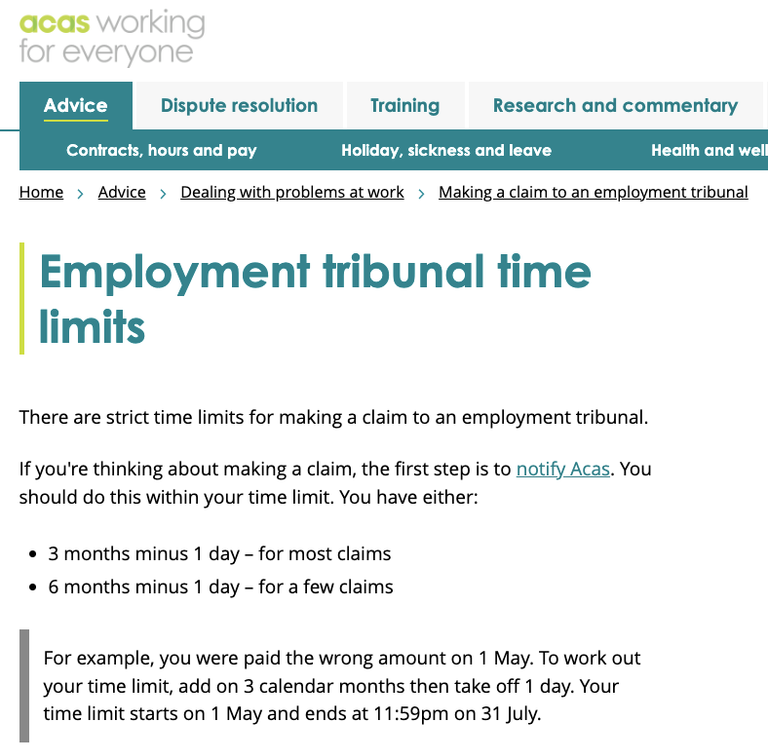Are employment tribunal deadlines too short...?
We get quite a few employment related queries at Citizens Advice, and a very common enquiry which I've seen several times already relates to workers having been underpaid when they leave a job.
This can be for various reasons ranging from straight up blatant no payment for say the last week out of a month's work through to disagreement over pro-rate holiday pay.
One of the sneakiest IMO, and apparently entirely legal, is not paying accumulated time off for overtime done - so the contract says if a worker does say 10 hours overtime this month, they are due 10 hours off next month, but often there's an explicit statement in the contract that says these hours don't carry over if the employee leaves, but there is a grey area when they are sacked.
Whatever the reason for a pay (or other) dispute - the typical employee or ex-employee who eventually contacts us usually tries to resolve the issue themselves by emailing their employer, or ex-employer.
Often they don't get a response, so they try again a couple of weeks later, then after another no response they contact us.
If they do this within a month, then they're O.K. because then we can advice them to go to ACAS, who can initiate a process called 'early conciliation' which is intervening with their employer on their behalf to try and get their issue resolved, and if that fails, they can then go to an employment tribunal - effectively like a court but, crucially, free!
NB there's no guarantee of the employer paying up or resolving whatever issue the employee, or ex-employee, has, but at least there's a route which costs no money, at least if they don't have to pay witness costs and win, if they lose they may have to pay out a small fortune in the employer's costs.

The three month minus one day deadline.
However there is a three month minus one day deadline for applying to a tribunal and that's after the issue first arose. So if the final pay-check is under dispute and that's dated 28th Feb, you have to apply to a tribunal by 27th May of that same year.
And you have to have gone through early conciliation first and for that to have failed, although the 3 month deadline is paused for up to 6 weeks while that goes ahead.
Delaying tactics....?
All this is well and good, but I've seen more than one case where they employee had a late-start on their grievance, for understandable reasons...
If they don't initially notice they've been underpaid, if they're reluctant to kick up a fuss, that can delay things by weeks.
Then if they approach their employer and they seem reasonable, telling them they are looking into it, another couple of week's delay, then they get an offer, then they reject it, this can go back and forth several times with more than a week's gap between emails.
It's quite feasible that they then come to us after almost three months, their email will sit on our list for a week because we are backed-up and lo and behold that 3 month deadline is already gone....
And I'm sure many employers can keep an early conciliation effort tied up for more than 6 weeks in more complex cases too.
I dunno, I just think 90 days is maybe a little bit on the short side...
Especially when there's basically naff all anyone can do after that, other than go through the small claims court, but that's usually too pricey for clients to bother with.
It can be a frustrating experience as an adviser, for sure!
So if you do have a grievance against yer employer, get on with it quick sharp!
Posted Using InLeo Alpha
Such things might be big problem while leaving a job, the most important one of which is the severance payment. In my country, if you resing voluntarily, you can't claim it. You have to be sacked to be able to claim it.